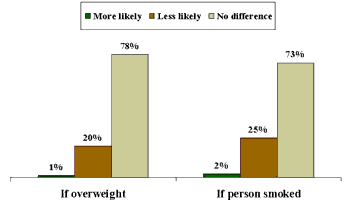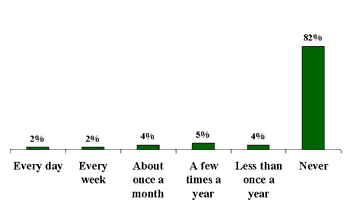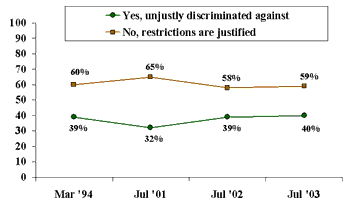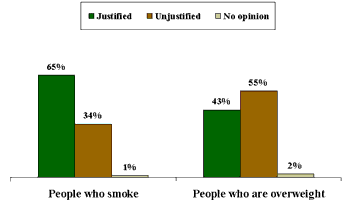GALLUP NEWS SERVICE
PRINCETON, NJ -- Most Americans deny harboring any prejudice against people who smoke or who are overweight, but to the extent they do, they are more likely to scorn smokers than overweight people.
Only 16% of Americans say the fact that a person is overweight makes them respect that person less; 21% admit they have diminished respect for someone who smokes. Similarly, the percentage who would be less likely to hire someone for a job on the basis of these characteristics is 20% for overweight persons but 25% for smokers.
These results come from Gallup's annual Consumption Habits survey, conducted July 7-9.
| If you were in a position to hire someone for a job, and you learned that the person [smoked/was overweight], would it make you more likely to hire that person, less likely, or would it make no difference? |
 |
| July 7-9, 2003 |
The same conclusion can be drawn from what smokers and self-identified overweight Americans say about their own experiences. About four in five overweight adults tell Gallup they never feel discriminated against in public life or employment, but 17% report that they have experienced such discrimination. For about half of these people (8%), the discrimination is fairly common -- happening daily, weekly, or monthly. For the rest (9%), it happens only a few times a year or less.
| How often do you feel discriminated against in public life or employment because of your weight -- every day, every week, about once a month, a few times a year, less than once a year, or never? |
 |
| Sample of 443 adults who say they are overweight -- July 7-9, 2003 |
Most likely, the incidence of weight discrimination is higher among the subset of overweight Americans who are truly obese, as opposed to only moderately overweight. But the sample size of obese Americans in Gallup's recent survey is too small to analyze. Only 4% of respondents told Gallup they are "very overweight" while an additional 39% said they are "somewhat overweight."
How would you describe your own personal weight situation right now -- very overweight, somewhat overweight, about right, somewhat underweight, or very underweight?
|
|
Some- |
|
Some- |
|
|
|
|
2003 Jul 7-9 |
4% |
39 |
50 |
5 |
1 |
1 |
Regardless, one can use the overall rate of reported discrimination (the 17% of overweight people who have felt discriminated against) to extrapolate the total number of Americans who have experienced these feelings. Out of the 215 million U.S. adults, it appears that roughly 16 million have suffered feelings of weight-related discrimination.
Two in Five Smokers Feel Put Upon
Gallup asked a different question about smokers' feelings of discrimination, one that focuses specifically on the increased restrictions on smoking in public places. In this context, Gallup finds 40% of smokers (roughly 22 million Americans) saying they feel unjustly discriminated against as smokers. This result is generally similar to what Gallup has found on this measure for the past decade.
| As a result of increased restrictions on smoking in public places, do you feel unjustly discriminated against as a smoker, or do you think the restrictions are justified? |
 |
The Obligatory Legal Angle
These findings are interesting from not only a sociological perspective, but a legal one. The New York Times recently reported on a number of overweight adults filing lawsuits against would-be employers for employment discrimination. According to the August 4 article ("Obese People Are Taking Their Bias Claims to Court"), if some advocates of the overweight have their way, obese persons would be a protected class under the Americans With Disability Act, or protected by laws that prohibit employment discrimination on the basis of appearance -- legislation already on the books in a handful of locales, including Michigan, Washington, and San Francisco.
It is unclear from the latest survey whether Americans would favor such legislation. Although the percentage of Americans who admit to holding an anti-smoker or anti-overweight-persons bias is relatively small, much larger proportions approve of policies that hold these groups accountable for their health-related characteristics. Nearly two-thirds of Americans believe it is justified to set higher health insurance rates for people who smoke. Close to half (43%) believe higher insurance rates for significantly overweight people would be justified.
| Do you think it would be justified or unjustified to set higher health insurance rates for [people who smoke/ people who are significantly overweight]? |
 |
| July 7-9, 2003 |
The Gallup Consumption Habits survey puts the rate of smoking at 25%, similar to what has been found for the last six years. Prior to that, from 1989 to 1997, the percentage of adult smokers had generally ranged from 26% to 29%. According to Gallup smoking trends dating back to 1944, the peak percentage of smokers in the United States was 45% in 1954.
Survey Methods
These results are based on telephone interviews with a randomly selected national sample of 1,006 adults, 18 years and older, conducted July 7-9, 2003. For results based on this sample, one can say with 95 percent confidence that the maximum error attributable to sampling and other random effects is ±3 percentage points. In addition to sampling error, question wording and practical difficulties in conducting surveys can introduce error or bias into the findings of public opinion polls.
13. Have you, yourself, smoked any cigarettes in the past week?
|
Yes |
No |
|
|
% |
% |
|
|
2003 Jul 7-9 |
25 |
75 |
|
2002 Jul 9-11 |
24 |
76 |
|
2001 Jul 19-22 |
28 |
72 |
|
2000 Nov 13-15 |
25 |
75 |
|
1999 Sep 23-26 |
23 |
77 |
|
1998 Jun 22-23 |
28 |
72 |
|
1997 Sep 25-28 |
26 |
74 |
|
1997 Jun 26-29 |
26 |
74 |
|
1997 Jun 23-24 |
26 |
74 |
|
1997 May 6-7 |
25 |
75 |
|
1997 Mar 24-26 |
27 |
73 |
|
1996 May 9-12 |
27 |
73 |
|
1994 Jul 15-17 |
27 |
73 |
|
1994 Mar 11-13 |
27 |
73 |
|
1991 Nov 7-10 |
28 |
72 |
|
1990 Jul 6-8 |
27 |
73 |
|
1989 May 15-18 |
27 |
73 |
|
Yes |
No |
|
|
% |
% |
|
|
1989 Apr 4-9 |
29 |
71 |
|
1988 Jul 1-7 |
32 |
68 |
|
1987 Mar 14-18 |
30 |
70 |
|
1986 Jun 9-16 |
31 |
69 |
|
1985 Jun 7-10 |
35 |
65 |
|
1983 |
38 |
62 |
|
1981 Jun 26-29 |
35 |
65 |
|
1978 Jan 20-23 |
36 |
64 |
|
1977 Aug 19-22 |
38 |
62 |
|
1974 May 10-13 |
40 |
60 |
|
1972 Apr 21-24 |
43 |
57 |
|
1971 May 14-17 |
42 |
58 |
|
1969 Jul 24-29 |
40 |
60 |
|
1957 Jun |
42 |
58 |
|
1954 Jun |
45 |
55 |
|
1949 Oct |
44 |
56 |
|
1944 Nov |
41 |
59 |
17. As a result of increased restrictions on smoking in public places, do you feel unjustly discriminated against as a smoker, or do you think the restrictions are justified?
BASED ON -- 219 -- SMOKERS
|
Yes, unjustly discriminated against |
No, restrictions |
No |
|
|
% |
% |
% |
|
|
2003 Jul 7-9 |
40 |
59 |
1 |
|
2002 Jul 9-11 |
39 |
58 |
3 |
|
2001 Jul 19-22 |
32 |
65 |
3 |
|
1994 Mar 11-13 |
39 |
60 |
1 |
25. All in all, does the fact that a person smokes make you respect them more, respect them less, or does it make no difference to you?
|
Respect |
Respect |
Makes no difference |
No |
||
|
% |
% |
% |
% |
||
|
2003 Jul 7-9 |
1 |
21 |
77 |
1 |
|
|
2001 Jul 19-22 ^ |
0 |
21 |
78 |
1 |
|
|
1994 Mar 11-13 |
0 |
14 |
85 |
1 |
|
|
1990 Jul 6-8 |
1 |
17 |
82 |
* |
|
|
* |
Less than 0.5% |
||||
|
^ |
Asked of a half sample. |
||||
26. If you were in a position to hire someone for a job, and you learned that the person smoked, would it make you more likely to hire that person, less likely, or would it make no difference?
|
More likely |
Less likely |
No difference |
No opinion |
|
|
% |
% |
% |
% |
|
|
2003 Jul 7-9 |
2 |
25 |
73 |
* |
|
1994 Mar 11-13 |
1 |
20 |
78 |
1 |
|
1991 Oct 24-27 |
1 |
21 |
77 |
1 |
|
1990 Jul 5-8 |
1 |
24 |
73 |
2 |
|
* Less than 0.5% |
||||
27. Do you think it would be justified or unjustified to set higher health insurance rates for people who smoke?
|
Justified |
Unjustified |
No opinion |
|
|
2003 Jul 7-9 |
65% |
34 |
1 |
28. Do you have occasion to use alcoholic beverages such as liquor, wine or beer, or are you a total abstainer?
|
Yes, |
No, total abstainer |
|
|
% |
% |
|
|
2003 Jul 7-9 |
62 |
38 |
|
2002 Jul 9-11 |
66 |
34 |
|
2001 Jul 19-22 |
62 |
38 |
|
2000 Nov 13-15 |
64 |
36 |
|
1999 Sep 23-26 |
64 |
36 |
|
1997 Jun 26-29 |
61 |
39 |
|
1996 Jun 27-30 |
58 |
42 |
|
1994 Jun 3-6 |
65 |
35 |
|
1992 Jan 16-19 |
64 |
35 |
|
1990 Dec 6-9 |
57 |
43 |
|
1989 Sep 12-15 |
56 |
44 |
|
1989 Apr 4-9 |
62 |
38 |
|
1988 Jul 1-7 |
63 |
37 |
|
1988 Mar 8-12 |
62 |
38 |
|
1987 Jul 10-13 |
65 |
35 |
|
1987 Apr 10-13 |
63 |
37 |
|
1987 Mar 14-18 |
65 |
35 |
|
1985 Feb 15-18 |
67 |
33 |
|
1984 Sep 6-9 |
64 |
36 |
|
1984 Jul 6-9 |
64 |
36 |
|
1983 Mar 11-14 |
65 |
35 |
|
1982 Aug 13-16 |
65 |
35 |
|
1981 Jan 9-12 |
70 |
30 |
|
Yes, |
No, total abstainer |
|
|
% |
% |
|
|
1979 May 4-7 |
69 |
31 |
|
1978 Nov 10-13 |
66 |
34 |
|
1978 Apr 21-24 |
71 |
29 |
|
1977 Jan 14-17 |
71 |
29 |
|
1976 |
71 |
29 |
|
1974 May 10-13 |
68 |
32 |
|
1969 Jan 1-6 |
64 |
36 |
|
1969 Feb 22-27 |
63 |
37 |
|
1966 Jan 21-26 |
65 |
35 |
|
1964 |
63 |
37 |
|
1960 Mar 30-Apr 4 |
62 |
38 |
|
1959 Dec 10-15 |
61 |
39 |
|
1958 Jan 24-29 |
55 |
45 |
|
1957 Mar 15-20 |
58 |
42 |
|
1956 Jan 6-11 |
60 |
40 |
|
1952 Dec 11-16 |
60 |
40 |
|
1951 Aug 26-31 |
59 |
41 |
|
1950 Jun 4-9 |
60 |
40 |
|
1949 Dec 1-6 |
58 |
42 |
|
1947 Oct 3-8 |
63 |
37 |
|
1946 Jul 26-31 |
67 |
33 |
|
1945 Nov 23-28 |
67 |
33 |
|
1939 |
58 |
42 |
35. All in all, does the fact that a person drinks alcohol make you respect them more, respect them less, or does it make no difference to you?
|
Respect |
Respect |
Makes no difference |
No |
|
|
2003 Jul 7-9 |
1% |
14 |
83 |
2 |
39. How would you describe your own personal weight situation right now -- very overweight, somewhat overweight, about right, somewhat underweight, or very underweight?
|
|
Some- |
|
Some- |
|
|
|
|
% |
% |
% |
% |
% |
% |
|
|
2003 Jul 7-9 |
4 |
39 |
50 |
5 |
1 |
1 |
|
2002 Nov 11-14 |
6 |
36 |
51 |
5 |
1 |
1 |
|
2002 Jul 9-11 |
6 |
34 |
55 |
5 |
* |
* |
|
2001 Nov 8-11 |
6 |
38 |
51 |
4 |
* |
1 |
|
2001 Jul 19-22 |
5 |
41 |
49 |
5 |
* |
* |
|
1999 Jul 22-25 |
4 |
35 |
53 |
6 |
1 |
1 |
|
1990 Oct 11-14 |
7 |
41 |
46 |
5 |
1 |
* |
|
* Less than 0.5% |
||||||
41. How often do you feel discriminated against in public life or employment because of your weight -- [ROTATED: every day, every week, about once a month, a few times a year, less than once a year, (or) never]?
BASED ON -- 443 -- ADULTS WHO SAY THEY ARE OVERWEIGHT
|
|
|
|
|
Less than once |
|
|
|
|
2003 Jul 7-9 |
2% |
2 |
4 |
5 |
4 |
82 |
1 |
48. Do you think it would be justified or unjustified to set higher health insurance rates for people who are significantly overweight?
|
Justified |
Unjustified |
No opinion |
|
|
2003 Jul 7-9 |
43% |
55 |
2 |
49. All in all, does the fact that a person is overweight make you respect them more, respect them less, or does it make no difference to you?
|
Respect |
Respect |
Makes no difference |
No |
|
|
2003 Jul 7-9 |
1% |
16 |
83 |
* |
|
* Less than 0.5% |
||||
50. If you were in a position to hire someone for a job, and you learned that the person was overweight, would it make you more likely to hire that person, less likely, or would it make no difference?
|
More likely |
Less likely |
No difference |
No opinion |
|
|
2003 Jul 7-9 |
1% |
20 |
78 |
1 |
